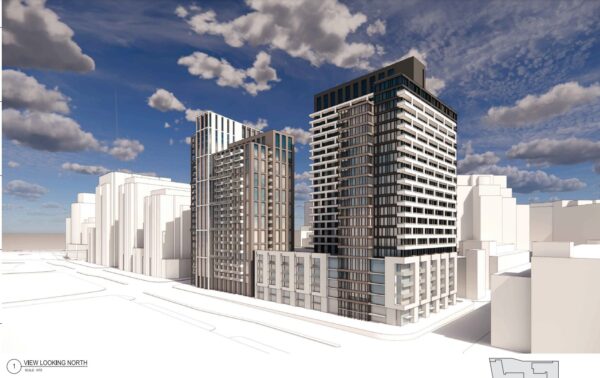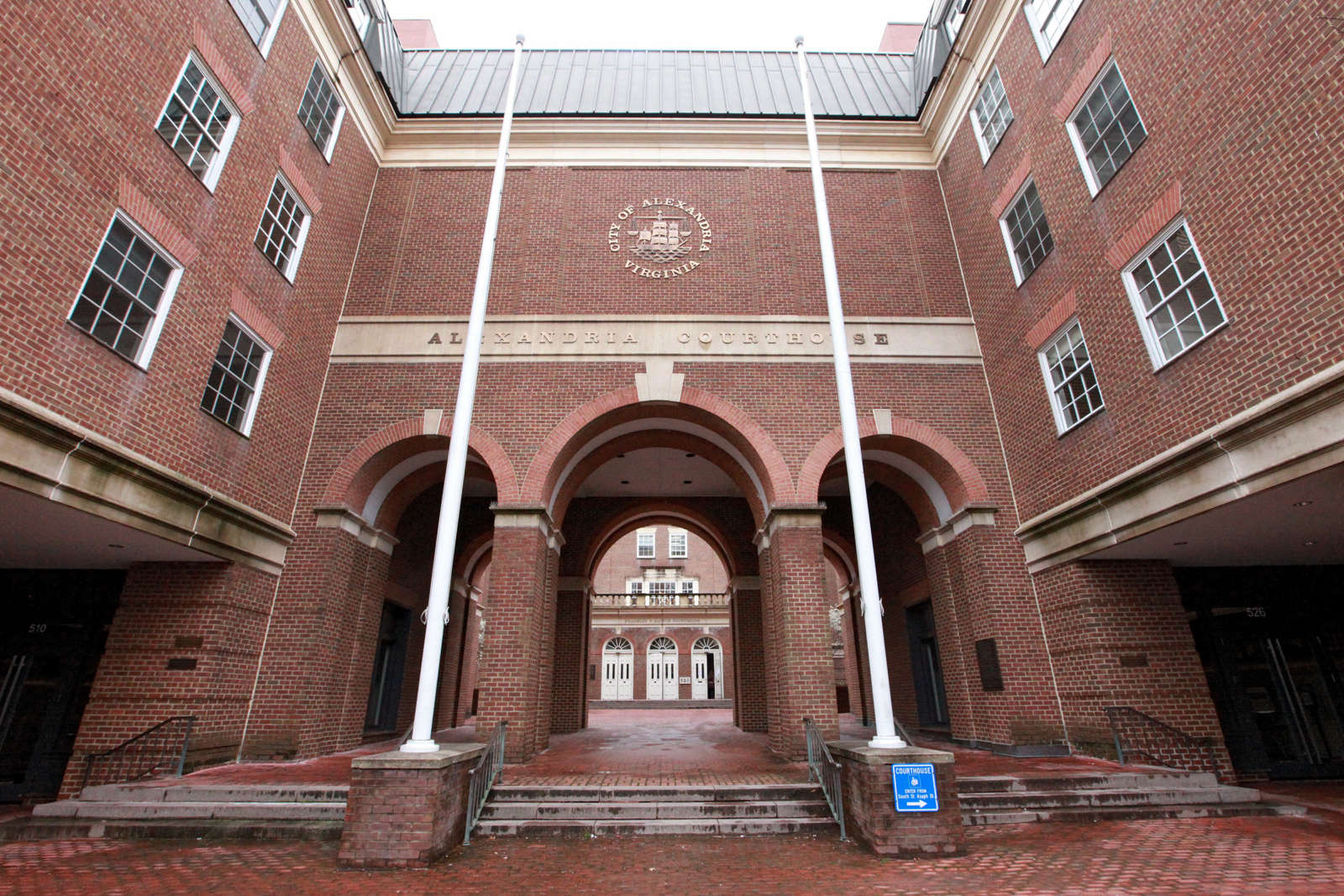
A last-minute disagreement between city staff and developers of a new development in Carlyle raised concerns about fairness in the city’s development process.
There was little indication before the City Council meeting (item 12) on Saturday, May 15, that the development at 2111 and 2121 Eisenhower Avenue would take up two hours of discussion and argument.
At the public hearing, the project faced both criticism from affordable housing advocates for its lackluster contribution and an 11th hour objection from staff over a technical development detail that amounted to a $1 million fee discrepancy.
The central question was whether or not the above-ground parking space at the site qualified as part of the square footage of a building for purposes of things like the developer contribution to affordable housing.
Vagueries and disagreement in what the city was asking from the developer led City Council member Kirk McPike to describe the whole issue as “Calvinball” — a reference to the game played in Calvin and Hobbes where the rules are inconsistent and change mid-game.
The staff report recommended approval, and there was no discussion of this issue at the Planning Commission.
“In recent days it’s become clear that there’s a difference of opinion between the applicant and staff on how to apply the $5.46 per square foot toward the above-ground parking portion of the residential development,” said Karl Moritz, Director of Planning and Zoning. “First, I do need to apologize to the applicant for the extreme lateness in bringing this issue to our collective attention … but staff’s view is that the Eisenhower East Plan is clear on what the contribution applies to and even more clear on what is exempt.”
Moritz said the condition applies to development built above ground and developments approved under the previous plan are exempt. The plan also exempts commercial development because the market for commercial development is challenging. Finally, the plan exempts bonus density applied to affordable housing.
Moritz said part of the analysis is what value is being created by the upzoning that the plan is providing — the increase in value that each property owner is getting.
Attorney Cathy Puskar represented applicant Mid-Atlantic Realty Partners and not only expressed disagreement with staff’s conclusion that the parking should qualify as square footage to be factored into the developer contributions, but said the process by which the issue was raised was unacceptable.
“We often have issues that come up at the last minute before we come to you at City Council and it’s always unfortunate but we’re able to work through it,” Puskar said. “In this instance it’s not only unfortunate it’s egregious. I received a call 23 hours before this hearing telling me that high-level staff at planning and zoning had a different interpretation of our obligation on the developer contribution than had been discussed during the small area plan, than had been agreed to, and has been documented in the conditions.”
Puskar said the disagreement amounted to a $1 million additional fee to pay the city.
The vagueness of the rules and their implementation in the development sparked some frustration from the dais.
“We’re voting on this language, we all agree on the language, but nobody agrees on what the language means,” McPike said. “There’s kind of a Calvinball aspect to this.”
“I love our staff, I think they do an amazing job,” said Vice Mayor Amy Jackson, “but that’s not cool, honestly, about this whole entanglement.”
There was some discussion of deferring the application until the language could be sorted out, but Puskar said the outcome would either be that the developer’s view of the issue is borne out or the city would stick with demanding the fee, which the developer either couldn’t or wouldn’t pay. There was some behind-the-scenes negotiation between staff and the developer during a recess in the meeting.
“Is there white smoke here somewhere?” Mayor Justin Wilson asked.
“I quit smoking,” Moritz said, “but I’m taking it back up now.”
Moritz and Puskar returned with a compromise that allowed the development to move forward but didn’t fully settle whether policy question regarding parking space.
Condition: Pursuant to the Eisenhower East Small Area Plan, a contribution is required
to the Eisenhower East Implementation Fund.a. Contribute $910,879.71 for Phase #1, and $1,088,856.21 for Phase #2;
b. Contribution rates are subject to an annual escalation clause equivalent to the
CPIU for the Washington Metro area. Contribution rates will be recalculated January of
each year. The final contribution amount shall be calculated and verified by the
Neighborhood Planning and Community Development Division of the Department of
Planning and Zoning at the time of Certificate of Occupancy. Payments shall be made
proportionally prior to the release of the first certificate of occupancy for each phase.2. An amendment to condition #123, stating the following:
Provide 20 and 24 set-aside rental units in the Phase #1 and Phase #2 respectively, as
indicated in Table 1, or in an effort to provide additional housing units, all one bedroom
units may be provided so long as the value of the one bedroom units is equivalent to
the value of the 13 2 bedroom units provided in Table 1, to be determined at the time
of Final Site Plan to the satisfaction of the Director of Housing.
The development was approved in a 5-0-1 vote, with City Council member Alyia Gaskins recusing herself due to a developer contribution.
Outside of the policy question, the development got some flack from the public over only providing 44 affordable housing units compared to 802 total new residential units.
“There are 800-some houses going to built and 44 are going to be affordable,” said Bert Bayou, director of African Communities Together. “This city is in a crisis. African immigrants and others who work jobs are in a crisis because affordable housing is diminishing. Having a new development with 44 affordable housing units being built is not enough.”
Sam Epps, political director of UNITE HERE Local 25, said the balance between total units and affordable units was unacceptable.
“[There are] 800 units and only 44 affordable housing units?” Epps said. “That is unacceptable. Who are you building these for? Not for people who live or work here.”
Puskar said she understood the frustration, but said any new affordable units was still a net gain.
“I can understand how people who testified said ‘you’re getting 800 units and we’re only getting 44 units,'” Puskar said. “What they’re failing to understand is there was an adopted plan in Eisenhower that permitted a certain amount of development. So had we not done this Eisenhower East plan there would be zero affordable residences… These 800 units will increase the housing supply in Alexandria, and in doing so: the more housing supply we have, the better off we are in terms of affordable housing.”
Despite the hours of argument, Wilson said he still thought it was a good plan.
“This is a great project and I want to make sure the discussion we just had didn’t minimize that,” Wilson said. “I’m really excited to see this come to fruition, I appreciate everyone sticking with it and I look forward to seeing it come out of the ground.”
Recent Stories

Good news, D.C. area. You can save money on your next home cleaning with Well-Paid Maids. It’s easy!
We offer a discount when you set up recurring cleans — and the discounts just increased this week!
For weekly cleans, get $30 off each cleaning.

Potomac Harmony is Back! Following a gap year of competing, then virtual rehearsals during the pandemic, followed by the well-earned retirement of our long-term director, a year of a director search, Potomac Harmony hit the regional contest stage in Concord, North Carolina in March for the first time since 2018! It was exhilarating, reaffirming, and rewarding!
The chorus hit all of its goals, the biggest of which was to have fun and sing our best on contest stage — we did both! Because we earned a score over 400 points, our new Director, Allison Lynskey, was awarded the Novice Director award, photo above. Additionally, one of our charter members, Jackie Bottash, was nominated for and honored with the Leadership Excellence award. It was a celebratory weekend!
What’s next? So much! We now look forward to upcoming performances, growing our membership, and expanding our musical product with new arrangements and an education component each week. It’s an exciting time to be part of this ever-growing ensemble!
Alexandria NAACP, Shiloh Baptist Church, DPC to hold City Council…
The Alexandria Branch of the NAACP, Shiloh Baptist Church, and The Departmental Progressive Club to hold the City Council Candidate Forum for ALL Candidates in the City of Alexandria Virginia. The event is Free of Charge and Open to The






